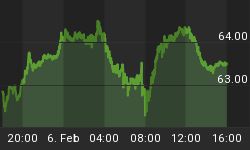"...For UK investors choosing to Buy Gold in 2008, the metal discharged itself without a word of complaint..."
WITH THE BANK OF ENGLAND hitting the panic button, slashing the returns-paid-to-UK-savers down to three-century lows at the start of December, the clear winners from its campaign to reboot the bubble so far have been gold investors stuck with Pounds to earn and Pounds to spend.
Since the Old Lady began cutting interest rates exactly 12 months ago, the number of UK investors choosing to own gold through our service here at BullionVault, for instance, has risen by more than 130%.
And so far, at least, they look to have made a wise choice...
- Since the start of December '07, the average UK house-price has dropped by 16% (Halifax data);
- The FTSE100 index has dropped by one-third;
- Tax-free cash ISAs (before inflation) have added just £3.40 to every £100 invested (according to the Bank of England's data);
- Government gilts - which typically benefit from lower Bank interest rates - have returned just under 13% (capital + coupon);
- The Gold Price in Sterling, in contrast, has risen by more than one-third, up by 33.4% and hitting a series of all-time record highs throughout November above £550 an ounce.
Manufacturing output, meantime - a key target for the Bank's devaluation policy - has contracted by around 10% (says the PMI index), even as the Pound in your pocket lost one-fifth of its international value on the currency markets.
Here at home, the Pound has lost 3.7 pence of its purchasing power since Base Rate began its descent from 5.75%...down at a near-record pace to just 2.0% today.
Cash savers have been hammered by Bank of England policy, in short. Just like they're being hammered by sub-zero real rates of interest worldwide. And now, like pretty much all government wonks everywhere too, the "business-friendly" socialist authorities are planning to borrow the nation out of its debt-led deflation on top.
That will only hurt government bond investors in turn, of course, even if it takes hedge fund managers (or rather, their clients) a few months to catch on. Most especially those hapless fund clients being fed into 5- and 20-year gilts at near-record low yields will soon wonder how on earth their "safe haven" gilts came to destroy their wealth. And meantime, it's little wonder so many private individuals are opting out of official paper entirely, choosing un-inflatable, un-indebted gold as a bolt-hole for a portion of their wealth.
Will it continue to gain vs. the Pound in 2009...? Nothing is certain beyond volatility. But Bank Rate now stands at its very lowest level since the Bank of England was founded in 1694. Measured against the Retail Price Index (Oct. data), the Bank's key lending rate now offers an annual loss of 2.2 pence in the Pound - the worst loss of purchasing power since May 1980.
In the last two months alone, and on a proportional basis, the Bank of England has slashed the returns paid to savers at the fastest pace since 1858.
Gold, on the other hand, has discharged its key duties for UK investors without a word of complaint in 2008 - defending them against a collapse in the currency and a fresh outbreak of idiocy in Westminster.
It is just a lump of metal, after all.















